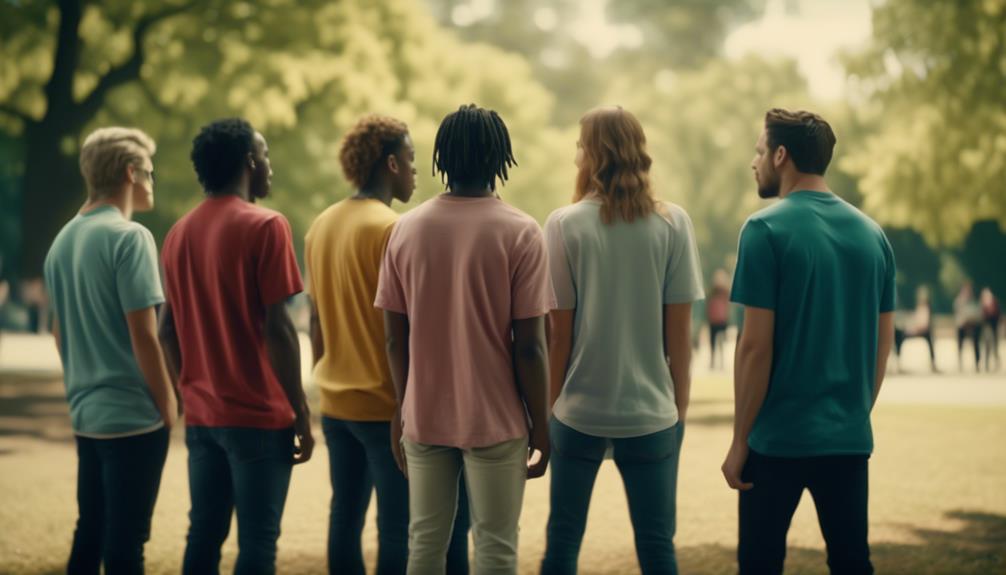What to Do When Friends Take Sides After a Breakup

You know, it's a real bummer when your breakup ends up causing a big ol' rift between your friends. It can really mess with your head and make you feel stuck in the middle of it all. But hey, don't throw in the towel just yet. There's still hope for finding some peace in the midst of this crazy situation.
So, what's the deal when your buddies start pickin' sides after a breakup? Well, let's dive into a few strategies that'll help you keep your sanity intact and hold onto those precious relationships.
Key Takeaways
- Give yourself space to reflect on the breakup and process your emotions.
- Communicate openly with friends about your feelings and create a safe space for dialogue.
- Maintain boundaries and avoid getting caught up in gossip or taking sides.
- Seek support from neutral individuals who can offer unbiased perspectives and emotional validation.
Assess the Situation and Your Feelings
Have you taken the time to honestly assess the situation and understand your own feelings after the breakup? It's crucial to give yourself the space and opportunity to reflect on what's happened and how it has affected you emotionally. Assessing your emotions allows you to gain clarity and insight into your own needs and desires moving forward.
Innovation in dealing with a breakup involves seeking therapy as a means to navigate through the emotional aftermath. Therapy provides a safe and non-judgmental space where you can explore your thoughts and feelings with a trained professional. A therapist can help you unpack the complex emotions that come with a breakup and guide you towards healing and growth.
During this assessment process, it's important to be gentle with yourself. Remember that healing takes time and it's okay to feel a range of emotions, from sadness to anger to confusion. Give yourself permission to experience these emotions without judgment.
Communicate Openly With Your Friends
When it comes to navigating the aftermath of a breakup and maintaining your friendships, open and honest communication is key. Take the time to have honest conversations with your friends, expressing your feelings and listening to theirs.
Honest Conversations Strengthen Friendships
To strengthen your friendships, it's crucial to have open and honest conversations with your friends. Building trust and managing expectations are key components of maintaining healthy relationships. Here are three tips to help you navigate those conversations:
- Be vulnerable: Share your feelings, thoughts, and concerns openly with your friends. This will create a safe space for them to do the same, fostering a deeper connection.
- Active listening: Truly listen to what your friends have to say, without judgment or interruption. Show empathy and validate their emotions, even if you may not fully understand or agree with their perspective.
- Seek understanding: Ask questions and seek clarification to gain a better understanding of your friends' experiences and viewpoints. This will help you avoid assumptions and miscommunication, leading to more meaningful conversations.
Clear Boundaries Maintain Relationships
Maintaining clear boundaries and open communication with your friends is essential for maintaining healthy relationships. When friends take sides after a breakup, it can create tension and strain on your friendships. To handle conflict and maintain boundaries, it's important to have honest conversations with your friends.
Clearly express your feelings and concerns, and listen to their perspectives as well. Avoid getting caught up in gossip or taking sides yourself. Instead, encourage open dialogue and understanding among your friends.
Set boundaries by letting them know what you're comfortable discussing and what topics are off-limits. By communicating openly, you can foster a supportive environment where everyone feels heard and respected, strengthening your friendships in the process.
Avoid Discussing the Breakup With Mutual Friends
If you're going through a breakup and have mutual friends, it's important to be mindful of avoiding discussions about the breakup with them. While it may be tempting to seek solace in the familiarity of your shared social circle, discussing the details of your breakup with mutual friends can often lead to complications and further emotional distress. Here are a few reasons why it's best to steer clear of discussing the breakup with your mutual friends:
- Maintaining neutrality: By avoiding discussions about the breakup with mutual friends, you allow them to remain neutral in the situation. This prevents them from feeling pressured to take sides or get involved in the drama.
- Protecting your privacy: Discussing the breakup with mutual friends can inadvertently lead to gossip and the spreading of personal information. It's important to protect your privacy and keep the details of your breakup between yourself and your ex-partner.
- Seeking professional help: Instead of relying solely on your mutual friends for support, consider seeking professional help. A therapist or counselor can provide you with unbiased guidance and help you navigate through the challenges of a breakup in a healthy and constructive manner.
Seek Support From Those Who Remain Neutral
When going through a breakup, it's important to have a support system that remains neutral. Seek out trusted confidants and allies who can provide a non-biased perspective on the situation. These individuals can serve as sounding boards, offering practical advice and insights without taking sides.
Building an unbiased support network will help you navigate the aftermath of the breakup with clarity and objectivity.
Trusted Confidants and Allies
Find solace in trusted confidants and allies who can provide support during this challenging time. When friends take sides after a breakup, it can feel isolating and overwhelming. However, there are people in your life who'll remain neutral and be there for you.
Here are three ways they can offer you the support you need:
- Listening ear: A trusted confidant will provide a safe space for you to express your feelings without judgment. They'll listen attentively, offering empathy and understanding.
- Objective perspective: Supportive allies can help you gain a fresh perspective on the situation. They can offer objective advice and help you see things from different angles, allowing you to make informed decisions.
- Emotional validation: During this difficult time, it's essential to have people who validate your emotions. Trusted confidants and allies will acknowledge your pain and offer comfort, reassuring you that your feelings are valid.
Lean on these trusted individuals as you navigate the aftermath of your breakup. Their support will help you heal and move forward with strength and resilience.
Non-Biased Sounding Boards
Seeking support from non-biased sounding boards can be incredibly valuable when navigating the aftermath of a breakup. It's natural to turn to friends and family for advice and support during this time, but sometimes their opinions may be colored by their loyalty to you or your ex-partner. That's where non-biased sounding boards come in.
These individuals are able to provide you with a fresh perspective and offer objective advice without taking sides. They can help you see the situation from different angles and challenge any assumptions you may have. It's important to establish healthy boundaries with your friends and family, letting them know that you appreciate their support, but also require impartial guidance.
However, if you find that you're struggling to cope with the aftermath of the breakup, seeking professional help from a therapist or counselor can be a beneficial step towards healing and moving forward.
Unbiased Support Networks
If you're feeling overwhelmed by the biased opinions of friends and family, it can be helpful to seek support from unbiased individuals who can provide a fresh perspective on your breakup. Maintaining neutrality in your support network can give you valuable insights and advice that isn't clouded by personal biases. Here are three ways to find unbiased support:
- Online support groups: Joining online communities or forums where people share their experiences can help you connect with individuals who offer unbiased advice and support. These platforms provide a safe space to discuss your situation openly and receive guidance from people who've gone through similar experiences.
- Therapist or counselor: Seeking professional help can be beneficial when dealing with a breakup. Therapists are trained to provide unbiased guidance and can help you navigate through the emotional challenges of a breakup. They can offer new perspectives and strategies to help you heal and move forward.
- Journaling or self-reflection: Taking time for self-reflection can provide unbiased support. Writing in a journal allows you to process your emotions, gain clarity, and discover new insights into your breakup. It can be a valuable tool for self-discovery and healing.
Focus on Self-Care and Personal Growth
Take this time after your breakup to prioritize your own self-care and personal growth. It's natural to feel overwhelmed and lost after a breakup, but focusing on yourself can help you heal and find new direction.
Start by engaging in self-reflection. Take the time to understand your emotions, thoughts, and needs. Journaling can be a powerful tool for self-reflection, allowing you to process your feelings and gain clarity.
In addition to self-reflection, incorporate self-care activities into your routine. Self-care isn't selfish; it's essential for your well-being. Find activities that bring you joy and comfort. It could be as simple as taking a long bath, going for a walk in nature, or indulging in your favorite hobbies. Prioritize your physical health by exercising regularly, eating nourishing meals, and getting enough sleep.
During this time of personal growth, it's important to set goals for yourself. Think about what you want to achieve in different areas of your life, such as career, relationships, and personal development. Break these goals into smaller, manageable steps, and work towards them consistently. Surround yourself with positive influences, whether it's through books, podcasts, or supportive friends.
Expand Your Social Circle and Make New Connections
Expand your social circle and make new connections by reaching out to like-minded individuals who share your interests and passions. As you navigate the challenges of friends taking sides after a breakup, expanding your horizons and finding common ground with new people can be a transformative experience. Here are three ways to do just that:
- Join clubs or organizations: Seek out clubs or organizations that align with your interests. Whether it's a book club, a hiking group, or a cooking class, engaging in activities you enjoy can lead you to meet people who share your passions. This not only allows you to expand your social circle, but it also provides an opportunity to learn and grow alongside individuals who are equally enthusiastic about the same things as you.
- Attend networking events: Attend events in your industry or areas of professional interest. Networking events aren't only great for career opportunities but also for meeting new people who may become friends. By connecting with like-minded individuals who are passionate about similar fields, you can forge connections that go beyond the boundaries of work and create a supportive network for personal growth.
- Volunteer for a cause: Find a cause or organization that resonates with you and dedicate your time and energy to it. Volunteering not only allows you to make a positive impact on the community but also provides an opportunity to connect with individuals who share your values and beliefs. By working together towards a common goal, you can form deep connections and expand your social circle with people who are driven by the same sense of purpose.
Expanding your social circle and making new connections is a powerful way to navigate the challenges of friends taking sides after a breakup. By seeking out individuals who share your interests and passions, you not only find common ground but also open yourself up to new experiences and perspectives. Embrace the opportunity to meet new people, forge meaningful connections, and continue growing as an individual.
Accept That Some Friendships May Change or End
Some friendships may naturally change or come to an end after a breakup, and it's important to accept and navigate this reality with empathy and self-care. Navigating changing friendships can be challenging, but it's an opportunity for growth and self-discovery.
Coping with the emotional fallout of losing friends during a breakup can be painful, but it's important to remember that it's not a reflection of your worth or value as a person.
First, it's crucial to give yourself permission to grieve the loss of these friendships. It's completely normal to feel a sense of sadness and loss when a friend chooses sides or distances themselves after a breakup. Allow yourself to experience these emotions, but also recognize that it's an opportunity for new connections and relationships to enter your life.
Next, focus on self-care. Surround yourself with supportive and understanding friends who uplift and encourage you during this challenging time. Engage in activities that bring you joy and help you heal, whether it's practicing yoga, journaling, or indulging in your favorite hobbies. Taking care of yourself emotionally, mentally, and physically will help you navigate the changing landscape of your friendships.
Lastly, be open to new friendships and connections. Breakups often lead to personal growth and self-discovery, and this can attract new, like-minded individuals into your life. Embrace the opportunity to meet new people and form meaningful relationships. Remember, change can be uncomfortable, but it also brings the potential for positive transformation and innovation in your social circle.
Frequently Asked Questions
How Do I Know if My Friends Have Taken Sides After My Breakup?
Feeling unsure if your friends have taken sides after your breakup? Look out for signs like them avoiding you or only talking about your ex. Coping with this can be tough, but remember to prioritize your own well-being and surround yourself with supportive people.
Should I Confront My Friends if I Suspect They Have Taken Sides?
If you suspect your friends have taken sides after a breakup, it's important to address the issue. Confrontation might lead to consequences, so approach them with empathy and focus on maintaining neutrality.
Is It Possible to Rebuild Friendships With Friends Who Have Taken Sides?
It is possible to rebuild friendships with friends who have taken sides. Rebuilding trust takes time and effort. Start by reconnecting and showing understanding. Be open to having honest conversations and find common ground to rebuild the friendship.
How Do I Handle the Awkwardness of Being Around Mutual Friends Who Have Taken Sides?
Navigating social situations post breakup can be uncomfortable, especially when mutual friends have taken sides. To maintain a neutral stance, focus on your own healing, set clear boundaries, and seek support from those who remain unbiased.
What Can I Do to Prevent My Friends From Feeling Like They Have to Choose Sides?
To maintain neutral relationships and prevent divisions among friends, focus on open communication and understanding. Encourage them to see both sides, remind them of the importance of friendship, and create opportunities for group activities that don't revolve around the breakup.











